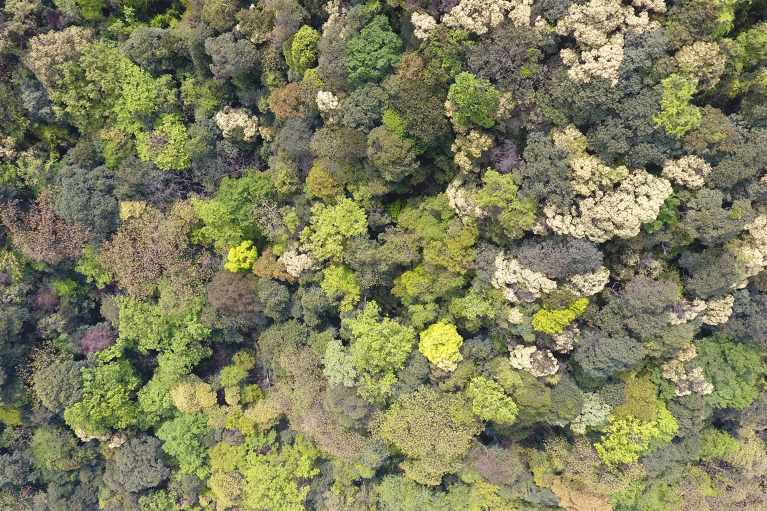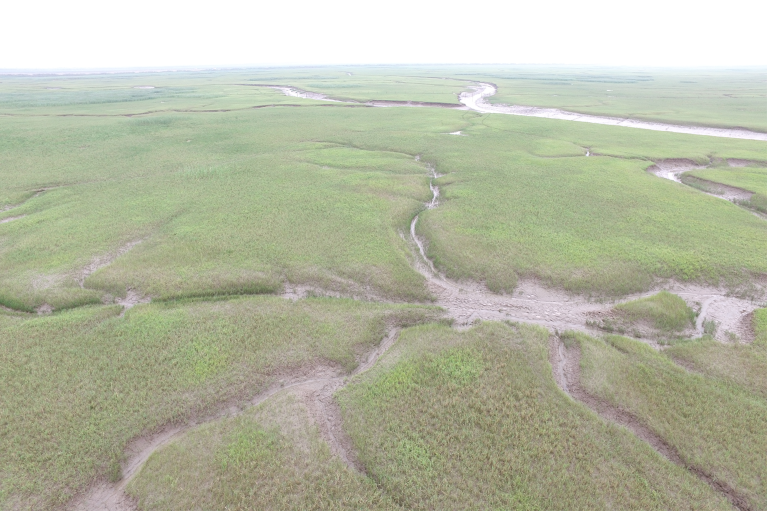
Tiantong National Forest Observation and Research Station is established to investigate forest biodiversity and ecosystem functioning.Credit: East China Normal University
Under rapid anthropogenic change, China’s diverse natural landscape has supported the research growth of the School of Ecological and Environmental Sciences (SEES) at East China Normal University (ECNU). Since the launch of its ecology programme in 1951, and building on its geographical edge in the megacity of Shanghai, and within the Yangtze Delta, SEES’s surveys have explored a spectrum of unique ecosystems across natural and urban environments.“We are all geared towards engineering nature-inspired solutions, and nurturing young ecologists to address global challenges, including climate change and biodiversity loss,” says the dean of SEES, Xiaoyong Chen.
Focus on biodiversity
Subtropical forests, of which China has a significant proportion of the world’s total, provide rich biodiversity and significant carbon sink capacity.Renowned for its research into subtropical evergreen broad-leaved forests, SEES has been leading studies into biodiversity maintenance, plant-animal interaction and coevolution, as well as ecosystem function.
Their insights into forest management and biodiversity conservation have contributed to practical conservation strategies. In 1983, SEES established one of the first long-term research stations near Tiantong in Ningbo City. As one of the first members of the Chinese National Ecosystem Observation and Research Network, set up in 2005, they have led studies of permanent forest plots, including National Nature Reserves of Fengyangshan-Baishanzu, Tianma, Tianmushan and Guanshan. They also supported the recovery of an endangered tree species endemic to Zhejiang province, Ostrya rehderiana, and reintroduced Chinese water deer (Hydropotes inermis) to a Shanghai wildlife sanctuary in 2006.
As urban development increasingly causes wildlife habitat loss and degradation, SEES ecologists have developed an innovative approach to integrate island ecosystems as a natural laboratory of ecology. Their observations include Zhoushan archipelago (one of the largest in China separated from the mainland about 9,000 years ago) and Thousand Island Lake (created in 1959 when a river was dammed). Their research weighed the ecological and evolutionary consequences of habitat fragmentation, environmental changes, and the tradeoffs between biodiversity and ecosystem functioning.

ECNU researchers study the marshes across the mouth of the Yangtze River surrounding Chongming Island, Shanghai.Credit: East China Normal University
Promoting wetland restoration
There is a sense of urgency in ECNU’s research into coastal wetland ecology, with coastal wetlands fast disappearing across Asia. ECNU is one of the first institutions in China to conduct such research, and published the first monograph on wetlands in 1990. Over the past three decades, ECNU has built a large number of long-term experiments in wetlands across the Yangtze River Delta and the Yellow River Delta.
Apart from the State Key Laboratory of Estuarine and Coastal Research, ECNU set up the Institute of Eco-Chongming in 2017, in collaboration with Fudan University, Shanghai Jiaotong University and the Chongming district government.
SEES ecologists have revealed strategies to restore degraded land and prevent further damage, and demonstrated the resilience of salt marshes for global conservation. For example, the theory of self-organization has been applied to restore the degraded salt marshes on Chongming Island.
An ecosystem warming experiment in the Yellow River Delta provided new evidence on the reduced magnitude and the shifted seasonality of CO2 exchange in coastal wetlands due to climate warming, underscoring the vulnerability of wetland CO2 sinks in coastal regions.
In the coastal wetlands of northern Hangzhou Bay, restoration engineering effectively enhanced CO2 uptake and reduced methane emissions.

ECNU is strategically located in Shanghai to advance urban ecology and sustainability science.Credit: East China Normal University
Urban Ecology and Sustainability
ECNU has been committed to solving emerging ecological and environmental problems in the face of rapid urbanization. Shanghai Key Laboratory for Urban Ecological Processes and Eco-Restoration, co-established by ECNU and the Science and Technology Commission of Shanghai Municipality, has three research areas: ecological processes and functions (system ecology), planning and management (sustainable ecology), as well as restorative engineering (restoration ecology).
As well as urban ecosystems, they have monitored the ecological processes of urban forests, water networks, and cropland in China’s most populated cities. Their urban vegetation studies also extend to ruderal species, having identified those with high drought tolerance, fast growth rates, and high seed yields, despite intensive human disturbance.
They have also been actively involved in eco-city planning and the processes of urban green and blue infrastructure. Highlighting their role as an ecological think tank in sustainable development are their diverse efforts, ranging from China’s first assessment framework for eco-cities, to environmental enhancement strategies for mega cities, such as water quality improvement for the Suzhou Creek Rehabilitation Project in Shanghai.
Tackling global environmental challenges
ECNU ecologists have been embracing the latest tools from gene editing to Earth system modelling to better define and understand ecological uncertainties.
At their Tiantong National Forest Ecosystem Observation and Research Station, they have performed experiments to explore how subtropical evergreen broad-leaved forests respond and adapt to extreme drought events, atmospheric nitrogen and phosphorus deposition, and different management practices.
Global Change and Ecological Forecasting (GCEF), a research centre launched by ECNU in 2016, considers the interactions between natural ecosystems and anthropogenic global changes. Specializing in both fundamental and applied ecological studies, it is well supported by the resources and infrastructure of ECNU’s Supercomputing Center, as well as multidisciplinary expertise across biology, social science, mathematics, and computer science.
“We are rolling out an ambitious long-term plan for international collaboration to promote ecological research and innovation,” says Chen. “Our ECNU faculty is dedicated to preparing our new generation of ecologists for global challenges, integrating theory and practice in natural ecosystems and urban sustainability.”


